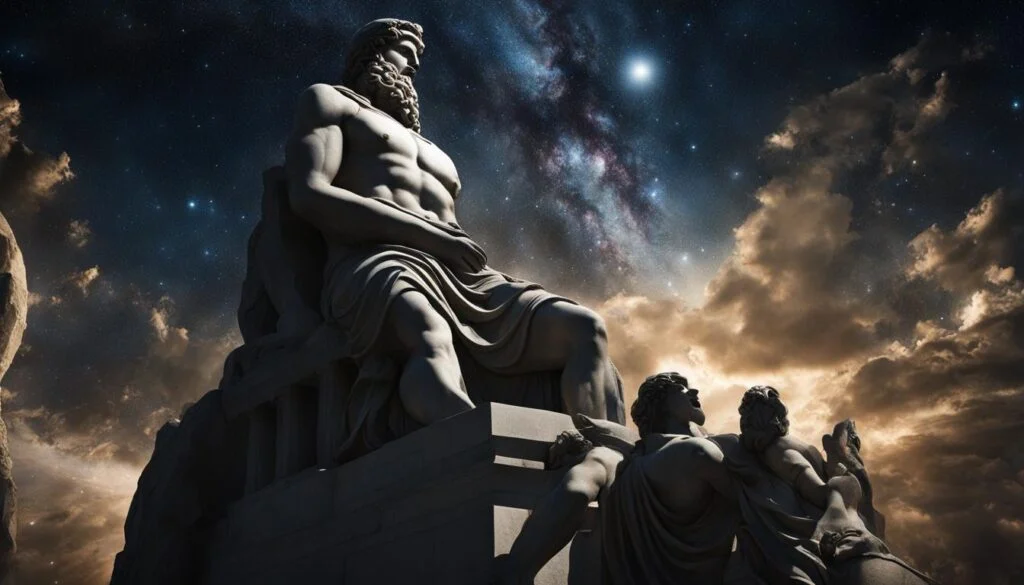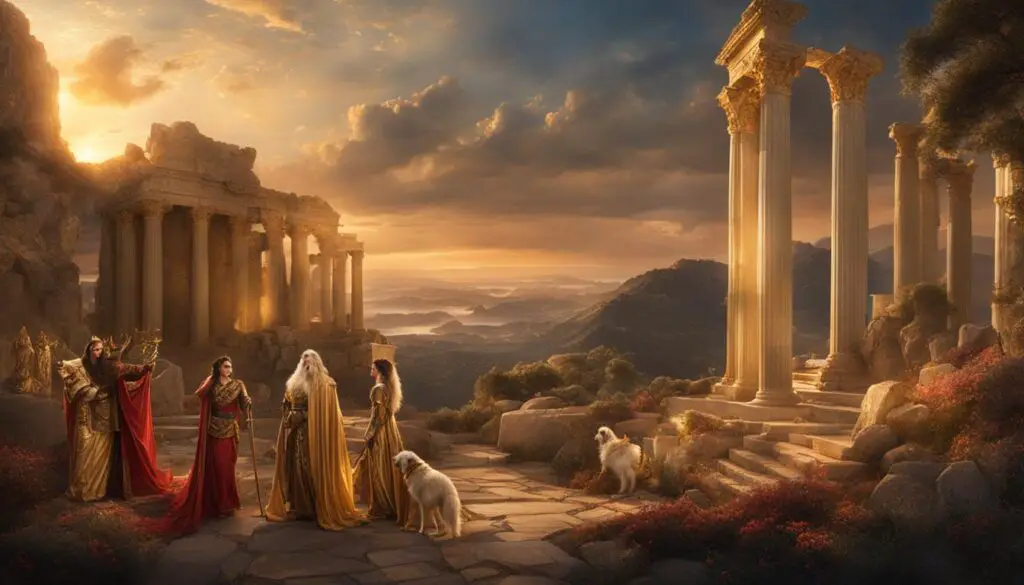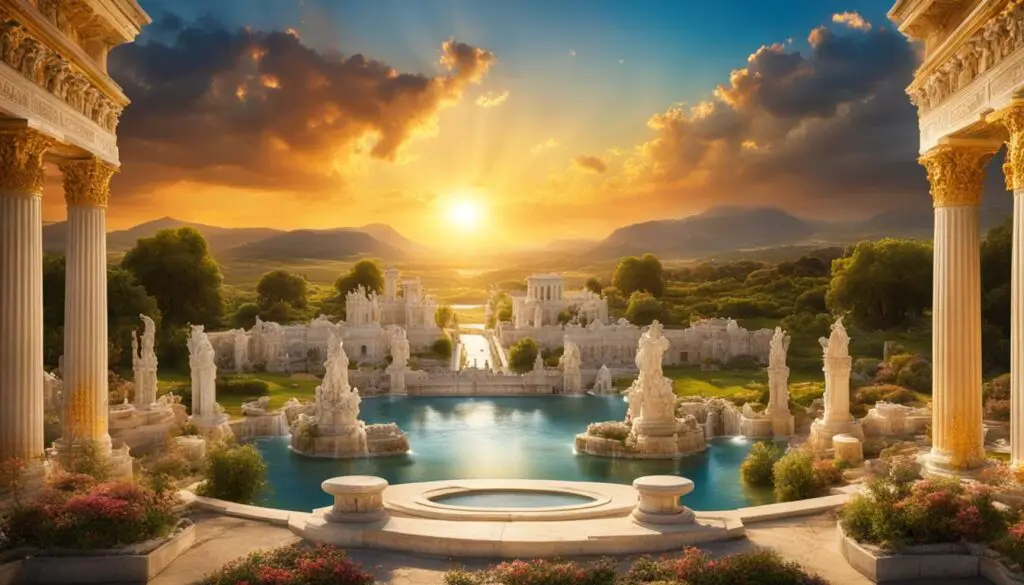Welcome to our exploration of Greek mythology! Today, we delve into the captivating realm of the afterlife and uncover whether Greek mythology has a concept of heaven. As we embark on this fascinating journey, we will discover that Greek mythology offers a complex tapestry of beliefs and destinations for the souls of the departed.
In Greek mythology, the notion of heaven, as commonly understood, does not exist. Instead, the focus is on different realms and afterlife destinations based on an individual’s actions and connections to the gods. While there is no specific “heaven,” we will be introduced to divine realms such as Elysium that are reserved for heroes and the righteous.
Key Takeaways:
- Greek mythology does not have a traditional concept of heaven.
- Instead, it features various realms and afterlife destinations.
- Individuals are allocated to different realms based on their actions and connections to the gods.
- Elysium is one of the divine realms reserved for heroes and the righteous.
- The legacy and symbolism of figures like Atlas shape our understanding of the cosmos in Greek culture.
The Mythology of Atlas: Exploring the Greek Titan and his Role
When delving into the rich tapestry of Greek mythology, it is impossible to ignore the enigmatic figure of Atlas. This titan, known for his monumental task of bearing the weight of the heavens, holds a significant place in ancient Greek mythology. The story of Atlas revolves around his role in the war against Zeus and his subsequent punishment, but it does not directly address the concept of heaven as we understand it today.
Atlas is often depicted as a towering figure holding the earth and sky on his shoulders, symbolizing the cosmic order and the intricate relationship between mortals and the divine realms. His punishment serves as a reminder of the consequences of defying the gods, but it does not provide a concrete explanation of the Greek mythological heaven.
While Atlas’s tale connects him to the divine and cosmic realms, it is important to note that Greek mythology does not explicitly mention a traditional concept of heaven. Instead, it offers a complex array of divine realms and afterlife destinations, each reserved for different individuals based on their actions and connections to the gods.
Exploring the Mythological Realms
- Elysium: Reserved for heroes and the righteous, Elysium is described as a paradise in Greek mythology. It offers a blissful existence for those favored by the gods.
- Underworld: The realm of Hades, where the souls of the deceased reside. It is a complex realm, with different sections for different souls based on their sins or virtues.
- Olympus: The home of the gods, where they reside and govern over mortal affairs. Olympus is a realm of divine power and influence.
These realms, along with others such as the Isles of the Blessed and the Fields of Asphodel, provide glimpses into the ancient Greek understanding of the afterlife. While there may not be a straightforward concept of heaven, the mythology surrounding Atlas and the divine realms in Greek mythology offers a fascinating exploration of the relationship between mortals, gods, and the cosmic order.
Atlas and his Interactions with Greek Heroes
Atlas, the titan from Greek mythology, played significant roles in numerous mythological stories that involved interactions with Greek heroes. His involvement showcased his importance and influence in the realm of Greek hero tales, but did not directly relate to the concept of heaven in Greek mythology.
1. Atlas and Heracles:
One notable encounter was between Atlas and Heracles, also known as Hercules. In one of his twelve labors, Heracles was tasked with obtaining the Golden Apples of the Hesperides. These apples were guarded by the Hesperides, nymphs who were the daughters of Atlas. Heracles sought the help of Atlas, who agreed to retrieve the apples as long as Heracles carried the weight of the heavens – a punishment bestowed upon Atlas for his involvement in the war against Zeus. Atlas was eventually relieved of his burden when Heracles tricked him into taking the heavens back.
2. Atlas and Perseus:
Another notable encounter involved Atlas and Perseus, the son of Zeus. Perseus sought the assistance of Atlas to retrieve the head of Medusa. However, Atlas, known for his arrogance, refused to help. As a result, Perseus turned him into stone, transforming Atlas into the Atlas Mountains that we know today. This punishment served as a reminder of hubris and the consequences of defying the gods.
These interactions between Atlas and Greek heroes highlight the titan’s pivotal role within Greek mythology. While they do not directly explore the concept of heaven, they contribute to the rich tapestry of Greek mythological stories and the complex relationships between gods and mortals.
Atlas’ Legacy and Symbolism

Atlas, a prominent figure in Greek mythology, left behind a lasting legacy that extends beyond the realm of mythology. His story and symbolism have had a profound influence on various aspects of Greek culture, shaping the way humans perceive strength, endurance, and the intricate relationship between the heavens and the earth.
One of the key aspects of Atlas’ legacy is his association with geography and astronomy. In Greek mythology, Atlas was not only known for his role in bearing the weight of the heavens but also for holding the pillars that separated the earth and the sky. This connection to the cosmos has influenced human understanding of the universe and our place within it.
Furthermore, Atlas is the ancestor of famous descendants, including the Hesperides and the Pleiades. These mythical beings have their own stories and roles in Greek mythology, adding to the significance of Atlas’ lineage. The tales of their exploits and connections to the gods further solidify the importance of Atlas’ legacy in the pantheon of Greek myths.
The Symbolism of Atlas
Atlas’ symbolism goes beyond his familial ties and cosmic responsibilities. He has become an emblem of strength and endurance, representing the ability to carry immense burdens and overcome challenges. Atlas’ image is often depicted as a muscular titan holding the weight of the heavens on his shoulders, showcasing his physical prowess and unwavering dedication.
- Strength and Stamina: Atlas personifies physical strength and the ability to endure hardships
- Divine Connections: As a titan, Atlas embodies the divine realm and its influence on mortal lives
- Geographical Significance: Atlas’ association with geography symbolizes the interconnectedness of the earth and the heavens
- Cosmic Order: By holding the pillars that separate the earth and sky, Atlas represents the preservation of cosmic balance and order
The legacy and symbolism of Atlas continue to captivate imaginations and inspire individuals to this day. His story serves as a reminder of the complex relationship between humans and the divine realm, illustrating the enduring power and relevance of Greek mythology in shaping our understanding of the world.
The Origins and Concept of Elysium in Greek Mythology
When it comes to Greek mythology, the afterlife holds a captivating allure. Today, we delve into the concept of Elysium, a realm of divine bliss and paradise for the righteous and heroes in Greek mythology. Whether you’re curious about the Greek afterlife beliefs, the belief in heaven, or the overall Greek mythology afterlife, join us as we unravel the mysteries of Elysium.
Key Takeaways
- Elysium is a realm in Greek mythology where the righteous, heroes, and those favored by the gods could reside.
- Positioned in the western edge of the Earth near the Ocean, Elysium is described as a paradise with lush parks and activities.
- Elysian Fields, located in Elysium, offers a blissful existence contrasting the realm of the dead.
- Ruled by prominent deities such as Cronos and Rhadamanthys, Elysium is exclusive and divine in nature.
- Greek mythology provides a diverse understanding of the afterlife that goes beyond a singular heaven.
The Elysian Fields: A Heavenly Realm in Greek Mythology

In Greek mythology, the concept of heaven may not exist in the traditional sense, but there is a heavenly realm known as the Elysian Fields. Situated within the realm of Elysium, this blissful destination is reserved for the chosen few who are considered heroes, righteous individuals, or favorites of the gods. Descriptions of the Elysian Fields vary, but they often depict a paradise of abundant natural beauty and pleasant climates.
Within the Elysian Fields, the blessed inhabitants engage in joyful activities and pursuits. Athletic competitions and musical enjoyment are among the cherished pastimes of those who are fortunate enough to reside in this divine realm. It exists separately from the realm of Hades, the underworld where the souls of the deceased reside, offering a contrasting existence of eternal happiness and glory.
The Nature of Elysium
- Elysium is a realm within Greek mythology, not a traditional concept of heaven.
- It is a paradise reserved for heroes, righteous individuals, and those chosen by the gods.
- The Elysian Fields are described as a place of abundant natural beauty and pleasant climates.
- The inhabitants engage in joyful activities such as athletics and music.
- Elysium offers a blissful existence separate from the realm of the dead in Hades.
The Elysian Fields and the realm of Elysium as a whole hold a significant place in Greek mythology. They offer a glimpse into the afterlife and the rewards that await individuals who have led virtuous lives or accomplished great deeds. While Greek mythology may not have a traditional heaven, the existence of Elysium and the Elysian Fields provide a unique perspective on the concept of a heavenly realm in ancient Greek beliefs.
Rulers and Residents of Elysium in Greek Mythology

In Greek mythology, the concept of heaven as understood in many religious traditions does not exist. However, the ancient Greeks had their own unique beliefs about the afterlife. One prominent realm in Greek mythology is Elysium, which is governed by powerful deities and inhabited by heroes and those chosen by the gods. Let’s explore the rulers and residents of Elysium in more detail.
In Greek mythology, Elysium is ruled over by notable gods and goddesses. One such ruler is Cronos, the titan associated with time and the father of Zeus, Poseidon, and Hades. Rhadamanthys, a son of Zeus, is another deity who governs Elysium. Known for his wisdom and just judgment, Rhadamanthys ensures the harmony and bliss of the blessed in Elysium.
Elysium is not only governed by divine rulers but is also home to a select group of inhabitants. Heroes and righteous individuals who have earned the favor of the gods are granted eternal residence in this heavenly realm. These heroes are celebrated for their extraordinary deeds and are rewarded with eternal happiness and glory in Elysium.
Key Takeaways:
- Elysium is a prominent realm in Greek mythology, serving as a heavenly afterlife destination.
- Cronos and Rhadamanthys are among the gods who govern Elysium.
- Elysium is inhabited by heroes and righteous individuals chosen by the gods.
- These heroes enjoy eternal happiness and glory in Elysium.
- The divine rulers maintain harmony and bliss in this blessed realm.
Conclusion
As we delve into Greek mythology, we uncover a fascinating array of beliefs surrounding the afterlife. While the concept of heaven as we commonly understand it may be absent, the Greeks offered a diverse understanding of the divine realms and destinies that await us beyond mortal life.
One such realm is Elysium, a paradise reserved for heroes, the righteous, and those favored by the gods. Governed by prominent deities like Cronos and Rhadamanthys, Elysium stands as a testament to the exclusivity and divine nature of the afterlife in Greek mythology.
Within this celestial abode, heroes find eternal happiness and glory, engaging in joyful pursuits amidst abundant natural beauty. Elysium represents the harmonious bond between mortal and divine, showcasing the intricate relationship between gods and humans.
While Greek mythology may not provide a singular heaven, it captivates us with its rich tapestry of divine realms and afterlife destinations. It invites us to contemplate the mysteries of the afterlife and our place in the cosmos, reminding us of the enduring power and significance of these ancient beliefs.
FAQ
Does Greek mythology have a concept of heaven?
No, Greek mythology does not have a concept of heaven in the traditional sense. Instead, it focuses on different realms and afterlife destinations for different individuals based on their actions and connections to the gods.
What is the role of Atlas in Greek mythology?
Atlas, a titan in Greek mythology, was known for his role in bearing the weight of the heavens as punishment for his involvement in the war against Zeus. He also held the pillars that separated the earth and sky.
How did Atlas interact with Greek heroes?
Atlas played significant roles in various mythological stories involving interactions with Greek heroes such as Heracles and Perseus. These interactions highlight Atlas’s importance in Greek hero tales, but do not directly relate to the concept of heaven.
What is the legacy and symbolism of Atlas in Greek mythology?
Atlas left behind a rich legacy in Greek mythology, symbolizing strength, endurance, and the intricate relationship between humans, the heavens, and the earth. Additionally, his association with geography and astronomy has shaped human understanding of the cosmos.
What is Elysium in Greek mythology?
Elysium is a concept in Greek mythology that refers to a realm of the afterlife where the righteous, heroes, and those connected to the gods could reside.
What is Elysian Fields in Greek mythology?
Elysian Fields, located in the realm of Elysium, is a place of heavenly bliss for the chosen ones in Greek mythology. It offers a blissful existence contrasting the realm of the dead.
Who rules and resides in Elysium in Greek mythology?
Elysium is governed by prominent deities such as Cronos and Rhadamanthys. It is inhabited by heroes, righteous individuals, and those chosen by the gods.




